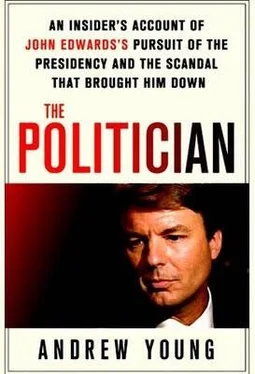Although almost everyone hates working the phones to raise campaign money, I don’t. My usual fear of public speaking doesn’t affect me on the phone, and I actually enjoyed the challenge. I would gather a group of six or eight telemarketers and back them up with the candidate and a few of our prominent academy members like Edwards’s law partner, David Kirby, and Wade Byrd, who was a big Edwards supporter from Fayetteville. (A character and a half, Byrd was a profane, boisterous guy who looked a lot like the actor Nick Nolte, roared around in a convertible Jaguar, and enjoyed expensive cigars and The Macallan single-malt Scotch.) The telemarketers would do the work of trying to get folks on the phone, which was roughly a one-in-five proposition. Whenever they got through, they’d pass the call to me, Edwards, or one of the prominent attorneys. It was a bit like fishing. Sometimes the clock would tick for half an hour and you’d get nothing. At other times we’d hit a lucky streak and everyone would get a bite at the same time. I added to the buzz by posting tallies on big sheets of paper stuck up on the wall. This made the whole thing like a game.
The keys to success with a telephone bank include conviction-you absolutely must believe in your candidate-keen listening, and a sense of timing. You aren’t going to raise much money if you spend twenty minutes on the phone with each person, and if you listen carefully, you can tell fairly quickly whether someone is likely to respond. I got pretty good at figuring out when I was wasting my time, and then saying, “Lordy, I’ve got another call coming in. I’ve gotta go.” I also knew how to land a fish when I got him hooked. Once, as I talked to a guy who was offering to give us the maximum donation allowed, I realized he thought he was actually talking to John Edwards, who was sitting next to me. I passed him a note that read, “He thinks he’s talking to you.” When I tried to hand him the phone, Edwards laughed and mouthed, “Keep going.” I did, and the fellow wound up “maxing out,” which meant he sent checks for the maximum amount under his name and his wife’s.
Edwards took a lot of calls during our first phone bank session, which he attended with his chief fund-raiser, Julianna Smoot. A native North Carolinian, thirty-one-year-old Julianna was just beginning to establish herself as a political consultant and finance expert for Democrats. With blue eyes and brown hair streaked with blond, she looked a little like Hillary Clinton and could match her when it came to smarts and intensity. In a business dominated by type A personalities, she was type A+ and an extremely effective and loyal right-hand woman. She helped Edwards home in on the health-care issues-a lot of people were angry with their insurance companies-and pick apart the weaknesses in the positions and campaign of the incumbent, Lauch Faircloth. Edwards was also guided by a first-time campaign manager named Josh Stein. A sincere, talented guy who grew up in Chapel Hill and graduated Harvard Law School, he was the kind of guy you want working for you in politics. Edwards also hired a top consultant/pollster named Harrison Hickman.
The incumbent, Republican Faircloth, was rich like John Edwards, but the similarities ended there. A seventy-year-old who had made his fortune in hog farming, Faircloth was an uninspiring speaker, and he looked terrible on television. After thirty or more years as a Democrat, he haxt mocrat,d switched to Republican in order to win the support of Jesse Helms. In 1992, he ran a nasty campaign where he used coded racist messages to unseat Terry Sanford. In Washington, Faircloth gained notoriety as a rabid critic of President Bill Clinton. He was obsessed with the Whitewater real-estate deal and Monica Lewinsky. In North Carolina, he failed to respond to constituents with the efficiency that made Helms so popular, and his plodding style was a handicap on the stump.
From the start of the campaign for Senate, Edwards stressed education, health care, and Social Security and was so good at rallies and on television that he excited even lifelong Republicans. (Typical was a “man on the street” named James Walker, who told the Winston-Salem paper he felt as though Edwards was “talking to me” when he appeared on TV.) Edwards spoke about restoring “integrity” in Washington, and his support for the death penalty helped him deal with charges that he was “ultraliberal.” He used his inexperience to claim to be a true outsider who would shake up national politics.
In his campaign, Faircloth had to do without his former guru/consultant Arthur Finkelstein-a slash-and-burn strategist-because Finkelstein had recently been outed as gay, and a superconservative senator couldn’t allow himself to be associated with a homosexual. Nevertheless, he followed the Finkelstein recipe, painting Edwards as an irresponsible ambulance chaser and running incendiary anti-Clinton TV ads attempting to make Edwards guilty by association. Both national parties threw big resources into the race. Clinton campaigned for Edwards. Former president George Herbert Walker Bush and his son, the future president, stumped for Faircloth. The last independent polls of the campaign gave Faircloth a slight lead, within the margin of error.
Like everyone else volunteering on the campaign, I threw myself into the effort, especially in the final weeks. I made hundreds of phone calls and used every connection I could to drum up donations and votes. Julianna had me put out hundreds of yard signs, including daily replacements of the signs in the Edwardses’ yard, which were shredded nightly by his Republican neighbors.
On election night, Cheri and I went to the ballroom of the North Raleigh Hilton, which was the Democratic Party’s headquarters for the evening. We were settling in for a long night when suddenly the results were announced by CNN at 8:45 P.M., with a graphic that showed Edwards the winner, 51 percent to 47 percent. (A third-party candidate got 2 percent of the vote.) Analysis would later show that Edwards won with a big majority among blacks and women and that he benefited from a national backlash against the Republican moralizers who had hounded President Clinton. (I also believed I saw in this the beginning of the end for the old Republican strategy of exploiting racism for votes.) But at the moment, all anyone knew was that Edwards had been elected. We shouted and hugged and cried as if we were members of a team that had just won the Super Bowl.
During the party that ensued, Wade Byrd brought me up to the Edwards suite in the hotel, where the senator-elect was getting used to the idea that he had won. Earlier in the day, he had refused to believe Harrison Hickman when he predicted a victory. In fact, he was so certain he was going t"1ee was go lose that he prepared only a concession statement and no victory speech. Now he seemed overjoyed as he celebrated with his wife, Elizabeth, teenage daughter, Cate, and infant daughter, Emma Claire, as well as his friends and campaign folks. But while he was the center of attention, Edwards impressed me when he noticed Emma Claire starting to cry and quickly picked her up and found a pacifier to help soothe her.
After a brief chat on the phone with President Clinton, Edwards went downstairs to the ballroom. Backstage, Elizabeth grabbed him and said, “You are a senator now. Act like one. The whole country is about to get their first impression of you.” The place exploded when he appeared, and he had trouble controlling the celebration as he praised his opponent, paid homage to Terry Sanford, who had recently died, and thanked everyone who had helped him. But the lines that struck me in the heart were near the end of the speech. “A very important thing happened today,” he told the happy crowd. “The people of North Carolina voted their hopes, instead of their fears.” To native Tar Heel Democrats like me, long distressed to be represented by a divisive figure like Jesse Helms, this was an amazing outcome.
Читать дальше











